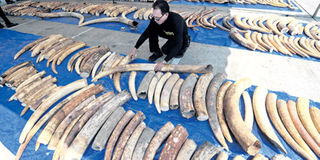Tusks were court evidence, say Thai officials

A Thai customs officer inspects elephant tusks in Bangkok on Monday. An inter-agency team has been formed to investigate whether part of the ivory seized in Thailand a few days ago was evidence stolen from Kenyan courts and reshipped to Bangkok. PORNCHAI KITTIWONGSAKUL | AFP
What you need to know:
- “Most of them were the tusks earlier seized and sent back to their origins in Africa whereas some were those having been kept as evidence in some countries,” said Gen Dapong.
- “Ivory is being stolen from the courtrooms. There is a lot of corruption, and many government officers are involved in facilitating the traffickers,” she stated.
- KWS spokesman Paul Gathitu said the corporation would be ascertaining the origin of the ivory: “This week we should be able to have investigated and established that court case evidence is being stolen and resold as claimed or not”.
Part of the massive ivory haul seized in Thailand was prosecution evidence stolen from Kenyan courts and reshipped to Bangkok.
Thailand’s Minister of Natural Resources and Environment Dapong Rattanasuwan and Director-General of Customs Somchai Sujjapongse told the media that they had reshipped seized ivory to Kenya to be used as evidence against ivory traffickers, only for the same consignment to find its way back to the Asian country last week.
The revelations have raised questions about the role of the Judiciary, the Kenya Revenue Authority (KRA), Kenya Ports Authority officials and police officers in the international criminal enterprise that fans poaching.
“Most of them were the tusks earlier seized and sent back to their origins in Africa whereas some were those having been kept as evidence in some countries,” said Gen Dapong.
On April 25, Thailand’s Customs Department seized 511 elephant tusks that had been declared at the customs office as 11 tonnes of tea leaves from Kenya destined for Laos.
Environment Secretary Judi Wakhungu promised to investigate how the ivory left Mombasa without detection.
The Sunday Nation has established that a criminal enterprise involving Kenyans and foreigners is involved in stealing and reselling ivory used as evidence against poachers in court cases. The syndicate is run from Asia and has major operations in Kenya.
A top Judiciary official told the Sunday Nation that the Judiciary does not have a strong room to keep the evidence.
“The evidence like ivory is presented to court by KWS [Kenya Wildlife Service] and the prosecutors who return it to their strong rooms,” said the official, who is not authorised to speak to the media.
STOLEN FROM COURTROOMS
Yesterday, Paula Kahumbu, the executive director of Wildlife Direct, a non-governmental organisation involved in conservation, said that ivory is stolen from courts and resold.
“Ivory is being stolen from the courtrooms. There is a lot of corruption, and many government officers are involved in facilitating the traffickers,” she stated.
Ms Kahumbu said that Kenya is now the leading transit route for ivory traffickers in the world.
“Containers filled with ivory are passing through Malaba, Lunga Lunga to the Mombasa port for onward shipping to Asian markets,” she said.
KWS spokesman Paul Gathitu said the corporation would be ascertaining the origin of the ivory: “This week we should be able to have investigated and established that court case evidence is being stolen and resold as claimed or not”.
KRA chief manager Maureen Njongo said investigation had begun into the matter: “The case is intricate and involves a lot of work to establish the facts”.
According to Traffic, a wildlife trade monitoring network, ivory trafficking is a sophisticated transnational crime that involves elephant poaching in protected areas and orchestrated theft of government-held ivory.
The cartels also use money laundering, tax evasion and other forms of economic subterfuge to hide profits and other evidence of financial dealings. In the report, Traffic says Kenya is a major transit route for ivory trade. Ivory passing though the Mombasa port is sent to Malaysia, Vietnam, Cambodia and United Arab Emirates before ending up in either Thailand or China.
A recent survey by the non-profit Wildlife Direct found that that police carry out shoddy investigations, resulting in a high number of acquittals, something that is feeding ivory trafficking.




